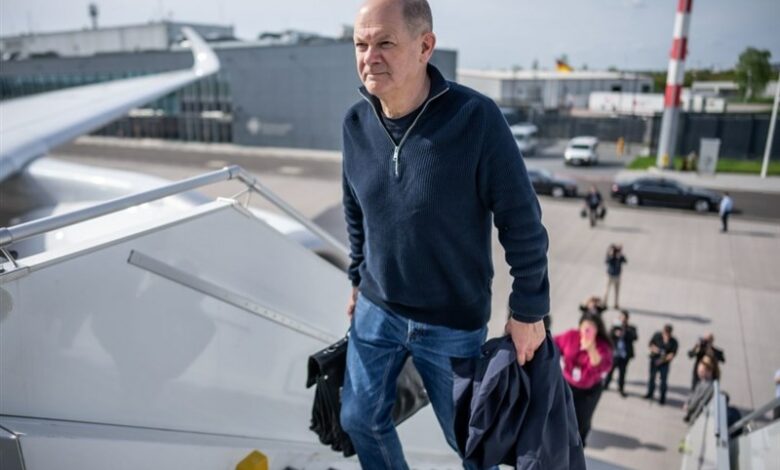The German Prime Minister’s visit to China with Ukraine as its focus

| The Prime Minister of Germany, together with a high-ranking business delegation, started a three-day trip to China yesterday, and negotiations on strengthening trade relations and the crisis in Ukraine with the authorities of this country are on the agenda. |
According to the report of the international group Tasnim news agency quoting “Stern” weekly, German Prime Minister Olaf Schultz visited China for the second time in his term of office. On his three-day trip to China, he landed on Sunday morning in the metropolis of Chongqing, which is the world’s most populous city with a population of 32 million. There, he plans to visit Bosch’s hydrogen drive production facility, talk to students about urban planning and meet with regional party secretary Yuan Jiajun.
Airstrike Iran has cast a shadow on the German Prime Minister’s visit to the occupied territories. The situation in the Middle East can also affect this trip in the next few days. Schultz’s next trip from Chongqing to the economic metropolis of Shanghai is scheduled for Monday. The German chancellor wants to meet with President Xi Jinping in Beijing on Tuesday.
Schultz will be accompanied by dozens of senior executives on this trip. These include the CEOs of Mercedes-Benz and BMW, as well as the chemical company BASF.
This is the second visit of the German Chancellor to China since taking office It is December 2021. His inaugural trip in November 2022 was only a one-day trip due to the spread of the Corona epidemic. This time he has spent three days – more than ever before – in one country in one trip. href=”https://www.tasnimnews.com” target=”_blank”>news Iran’s air strike on the Zionist regime and spoke to trusted people, including Jens Plotner, his foreign policy advisor.
Schultz will now be in China for three days, an unusually long trip abroad. Several hours are scheduled to meet with Chinese President Xi Jinping on Tuesday alone. These talks will be about fair trade, the climate and the situation in Ukraine.
For the past few days, the Ministry of Foreign Affairs and the Chancellor of Germany have been busy monitoring the situation in the region, designing scenarios and There have also been information evaluations.
Scholz will probably have to change parts of his program at least for Sunday and Monday due to Iran’s missile attack on the occupied territories.
One of the reasons for the German chancellor’s visit to China is to learn to read China better, but also to express personal interests clearly. When it comes to economic issues and security policy, of course, there is widespread anger and frustration in the Chancellor’s Office about China’s actions. Although China does not directly supply Russia with weapons, it does supply a variety of goods that enable the Kremlin to continue, and in some cases even accelerate, the war. According to the chancellor’s office, in any case, China is not neutral.
According to the German chancellor’s office, Xi Jinping’s approach to Ukraine is against “Germany’s core interests” ” and this issue will be addressed very clearly. According to Schultz, it would be good if the Chinese government agrees to the invitation to the peace conference that Switzerland will hold in June. There are relations with China. China has flooded the European market with subsidized electric cars, with low-cost products such as batteries, devices and solar panels. The European Union Commission is considering punitive tariffs on Chinese exports to compensate for competitive disadvantages. This in turn creates excitement in the German economy, as possible countermeasures are likely to affect them. For many large German companies, access to the large Chinese market is essential. There is currently no viable alternative for Germany.
Last summer, Germany’s coalition government adopted a China strategy aimed at reducing economic dependence on the country, in order to avoid dire situations such as To prevent what happened when Russian gas was cut off after the attack on Ukraine. However, this strategy does not really work for the German economy. About 5,000 German companies in China are mostly concerned about unfair competitive conditions and exporters worried about declining sales figures. On the contrary, cheap Chinese electric cars are invading the European market. The EU Commission has therefore launched an investigation into possible illegal subsidies. If this leads to retaliatory measures, German automakers in particular fear it could lead to a trade war. Man should pay. These include the suppression of the Uighur Muslim minority in Xinjiang province and freedom of expression. Human rights organizations are calling on the chancellor to speak clearly to China’s leadership.
end of message/
| © | Webangah News Hub has translated this news from the source of Tasnim News Agency |


